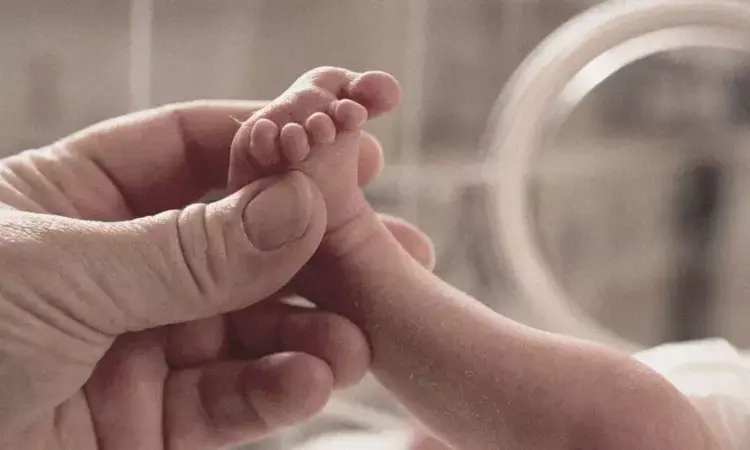- Home
- Medical news & Guidelines
- Anesthesiology
- Cardiology and CTVS
- Critical Care
- Dentistry
- Dermatology
- Diabetes and Endocrinology
- ENT
- Gastroenterology
- Medicine
- Nephrology
- Neurology
- Obstretics-Gynaecology
- Oncology
- Ophthalmology
- Orthopaedics
- Pediatrics-Neonatology
- Psychiatry
- Pulmonology
- Radiology
- Surgery
- Urology
- Laboratory Medicine
- Diet
- Nursing
- Paramedical
- Physiotherapy
- Health news
- Fact Check
- Bone Health Fact Check
- Brain Health Fact Check
- Cancer Related Fact Check
- Child Care Fact Check
- Dental and oral health fact check
- Diabetes and metabolic health fact check
- Diet and Nutrition Fact Check
- Eye and ENT Care Fact Check
- Fitness fact check
- Gut health fact check
- Heart health fact check
- Kidney health fact check
- Medical education fact check
- Men's health fact check
- Respiratory fact check
- Skin and hair care fact check
- Vaccine and Immunization fact check
- Women's health fact check
- AYUSH
- State News
- Andaman and Nicobar Islands
- Andhra Pradesh
- Arunachal Pradesh
- Assam
- Bihar
- Chandigarh
- Chattisgarh
- Dadra and Nagar Haveli
- Daman and Diu
- Delhi
- Goa
- Gujarat
- Haryana
- Himachal Pradesh
- Jammu & Kashmir
- Jharkhand
- Karnataka
- Kerala
- Ladakh
- Lakshadweep
- Madhya Pradesh
- Maharashtra
- Manipur
- Meghalaya
- Mizoram
- Nagaland
- Odisha
- Puducherry
- Punjab
- Rajasthan
- Sikkim
- Tamil Nadu
- Telangana
- Tripura
- Uttar Pradesh
- Uttrakhand
- West Bengal
- Medical Education
- Industry
Delaying Inguinal Hernia Repair in Preterm Infants Linked to Fewer Complications: New Meta-Analysis Suggests

Brazil: A recent systematic review and meta-analysis has provided valuable insights into the timing of inguinal hernia repair in preterm infants, comparing early versus late surgical intervention. The study, which incorporated trial sequential analysis, highlights that delaying the repair until after the infant’s discharge from the hospital may result in fewer negative outcomes.
"In preterm infants, early repair, performed before hospital discharge, lowered the risk of hernia incarceration (OR 0.44). However, it was linked to a higher likelihood of recurrence (OR 4.18) and respiratory complications (OR 3.91) compared to late repair. Given the fewer negative outcomes associated with delayed surgery, it may be beneficial to postpone hernia repair until after hospital discharge," the researchers reported in the Indian Journal of Surgery.
Inguinal hernia is a common condition in preterm infants, with the incidence being higher in those born before 32 weeks of gestation. Traditionally, early surgical repair of inguinal hernias has been the preferred approach to avoid complications like incarceration or strangulation. However, the timing of the surgery has been a topic of debate, as preterm infants are at increased risk of anesthesia-related complications, infection, and other surgical risks.
There is conflicting evidence on the optimal timing for inguinal hernia repair in preterm infants. To address this uncertainty, Fernanda Valeriano Zamora, Faculty of Medicine, Rio de Janeiro State University, Rio de Janeiro, Brazil, and colleagues conducted a systematic review and meta-analysis to compare the outcomes of hernia repair performed either before or after hospital discharge.
For this purpose, the researchers searched PubMed, Embase, and Cochrane databases until April 2024 for studies comparing early versus late inguinal hernia repair in preterm infants. They calculated odds ratios (ORs) for binary outcomes, accompanied by 95% confidence intervals (CIs), and assessed heterogeneity using I2 statistics. A total of nine studies involving 3,213 patients were included in the analysis.
Key Findings:
- Of the 3,213 patients, 2,024 (62.9%) underwent early inguinal hernia repair.
- Early repair was significantly associated with reducing incarceration development (OR 0.44) compared to late repair.
- Preterm infants who underwent late repair had significantly lower odds of recurrence (OR 4.18) and respiratory complications (OR 3.91) than early repair.
Late inguinal hernia repair was linked to fewer negative outcomes in preterm infants compared to early repair. These findings suggest that postponing the hernia repair until after the initial hospital discharge may be beneficial.
"Overall, the updated systematic review and meta-analysis provide strong evidence that delaying inguinal hernia repair in preterm infants may be a safer and more effective approach, improving patient outcomes while reducing the associated surgical risks," the researchers concluded.
Reference:
de Farias Santos, A.C.F., Zamora, F.V., Galvão, L.K.C.S. et al. Early vs. Late Inguinal Hernia Repair in Preterm Infants: An Updated Systematic Review and Meta-Analysis with Trial Sequential Analysis. Indian J Surg (2025). https://doi.org/10.1007/s12262-024-04251-2
Dr Kamal Kant Kohli-MBBS, DTCD- a chest specialist with more than 30 years of practice and a flair for writing clinical articles, Dr Kamal Kant Kohli joined Medical Dialogues as a Chief Editor of Medical News. Besides writing articles, as an editor, he proofreads and verifies all the medical content published on Medical Dialogues including those coming from journals, studies,medical conferences,guidelines etc. Email: drkohli@medicaldialogues.in. Contact no. 011-43720751


